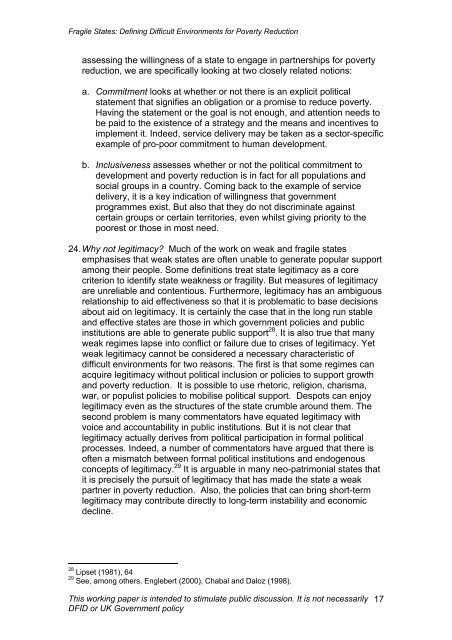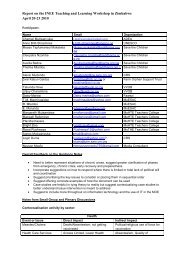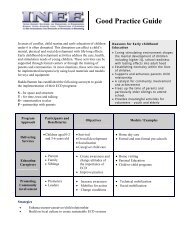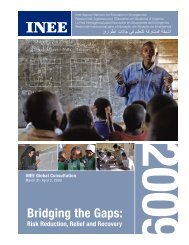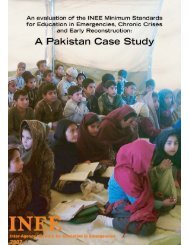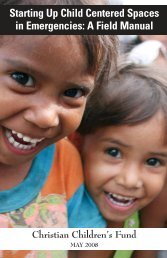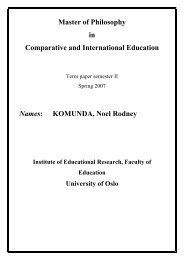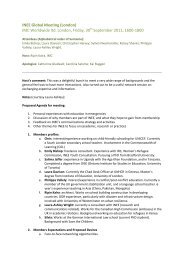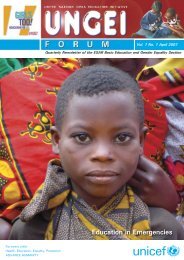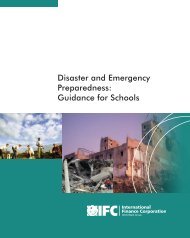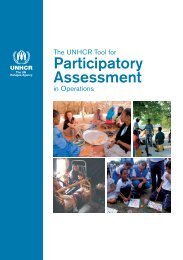Fragile States: Defining Difficult Environments for Poverty ... - INEE
Fragile States: Defining Difficult Environments for Poverty ... - INEE
Fragile States: Defining Difficult Environments for Poverty ... - INEE
Create successful ePaper yourself
Turn your PDF publications into a flip-book with our unique Google optimized e-Paper software.
<strong>Fragile</strong> <strong>States</strong>: <strong>Defining</strong> <strong>Difficult</strong> <strong>Environments</strong> <strong>for</strong> <strong>Poverty</strong> Reductionassessing the willingness of a state to engage in partnerships <strong>for</strong> povertyreduction, we are specifically looking at two closely related notions:a. Commitment looks at whether or not there is an explicit politicalstatement that signifies an obligation or a promise to reduce poverty.Having the statement or the goal is not enough, and attention needs tobe paid to the existence of a strategy and the means and incentives toimplement it. Indeed, service delivery may be taken as a sector-specificexample of pro-poor commitment to human development.b. Inclusiveness assesses whether or not the political commitment todevelopment and poverty reduction is in fact <strong>for</strong> all populations andsocial groups in a country. Coming back to the example of servicedelivery, it is a key indication of willingness that governmentprogrammes exist. But also that they do not discriminate againstcertain groups or certain territories, even whilst giving priority to thepoorest or those in most need.24. Why not legitimacy? Much of the work on weak and fragile statesemphasises that weak states are often unable to generate popular supportamong their people. Some definitions treat state legitimacy as a corecriterion to identify state weakness or fragility. But measures of legitimacyare unreliable and contentious. Furthermore, legitimacy has an ambiguousrelationship to aid effectiveness so that it is problematic to base decisionsabout aid on legitimacy. It is certainly the case that in the long run stableand effective states are those in which government policies and publicinstitutions are able to generate public support 28 . It is also true that manyweak regimes lapse into conflict or failure due to crises of legitimacy. Yetweak legitimacy cannot be considered a necessary characteristic ofdifficult environments <strong>for</strong> two reasons. The first is that some regimes canacquire legitimacy without political inclusion or policies to support growthand poverty reduction. It is possible to use rhetoric, religion, charisma,war, or populist policies to mobilise political support. Despots can enjoylegitimacy even as the structures of the state crumble around them. Thesecond problem is many commentators have equated legitimacy withvoice and accountability in public institutions. But it is not clear thatlegitimacy actually derives from political participation in <strong>for</strong>mal politicalprocesses. Indeed, a number of commentators have argued that there isoften a mismatch between <strong>for</strong>mal political institutions and endogenousconcepts of legitimacy. 29 It is arguable in many neo-patrimonial states thatit is precisely the pursuit of legitimacy that has made the state a weakpartner in poverty reduction. Also, the policies that can bring short-termlegitimacy may contribute directly to long-term instability and economicdecline.28 Lipset (1981), 6429 See, among others, Englebert (2000), Chabal and Daloz (1998).This working paper is intended to stimulate public discussion. It is not necessarilyDFID or UK Government policy17


